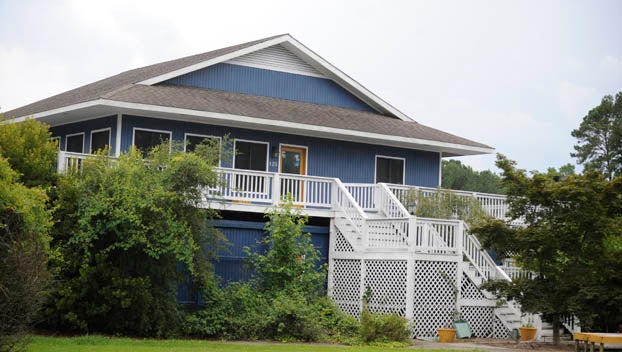Judge orders reversal of Powell Place decision
Published 8:00 pm Friday, January 14, 2022

- The former Racquet Club of Washington facility is located at 123 Avon Avenue in Washington. (Brandon Tester / Washington Daily news)
|
Getting your Trinity Audio player ready...
|
A Beaufort County Superior Court judge ordered that the Washington City Council’s denial of the proposed preliminary plat for the Powell Place subdivision be “reversed and remanded” to City Council for immediate approval.
The city filed on Friday a notice of appeal to the state North Carolina Court of Appeals.
Property owners Bill and Dale Peele have been trying to get the necessary approvals to turn the defunct Washington Racquet Club into a new subdivision called Powell Place. City Council denied preliminary plat proposals for the subdivision twice last year; both times, the planning board unanimously recommended that City Council approve the plat.
The Peeles were granted a writ of certiorari in which they asked the court to decide, among other things, whether granted their “due process rights, that this decision was based upon, competent, material, and substantial evidence in the whole record, was impartial in nature, and that the decision was not arbitrary and capricious.”
The city responded with a motion to dismiss the writ, and also filed a motion to strike the petition for the writ from the court record.
A hearing on the case was held on Nov. 17, 2021, and Judge Joshua W. Willey Jr. filed the order on Dec. 28, 2021.
Here’s the breakdown of the court order:
· The city’s motion to dismiss the writ for lack of subject matter jurisdiction was denied.
· The city’s motion to dismiss on the grounds that the petitioners failed to “meet their affirmative burden to establish standing on the record at the City Council and on the face of the petition” was granted; therefore, the petitioners — Powell Place Properties East, Bill and Dale Peele — were dismissed from the proceedings
· The city’s motion to dismiss for “failure to allege a claim on which relief can be granted as a matter of law” was denied.
· The city’s motion to strike the petition was denied.
· The city’s motion to strike the affidavits of the petitioners was granted.
· The petitioners’ motion for preliminary injunction was denied as moot.
In the order, Willey wrote that the motion to deny approval of the proposed preliminary subdivision plat set forth three grounds in support of the denial — including noncompliance with specific standards of the city’s subdivision ordinance; inconsistency with the “general standards as well as purposes contained in the city’s subdivision ordinance, including but not limited to public safety, traffic, density, and welfare issues”; and/or the “detrimental impact this subdivision would have on surrounding landowners, the nearby community, and the character of the existing development in the nearby area.”
“Although Community and Cultural Services Director Mike Dail’s presentation to the City Council noted that the proposed preliminary subdivision plat does not completely meet ‘a couple of minor standards,’ he further noted that the second entrance into the subdivision which resulted in noncompliance with the standard, was added at the request of the Planning Board,” Willey wrote. “Mr. Dail further concluded by saying that the plat complied with the purpose and intent of the ordinance.
Willey noted that the planning board unanimously recommended the approval of the preliminary plat.
“Had the City Council felt that noncompliance with a couple of minor standards was a sufficient reason to deny approval, it would not have found it necessary to rely on subjective standards as set forth in … the motion to deny,” Willey wrote. “There was absolutely no evidence to support denial of approval based upon the subjective standards. The reliance on these subjective standards, totally unsupported by substantial competent evidence, demonstrates the arbitrary and capriciousness of the decision.”




